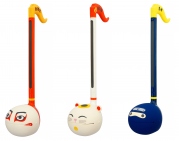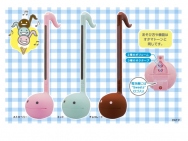Novmichi Tosa
Creative genius of Maywa Denki
ABOUT
Spinning off their father's old vacuum tube-manufacturing company, in 1993, brothers Masamichi and Novmichi Tosa established a performance arts collective called Maywa Denki.
The company is well known for its ‘nonsense machines’ that involve the public in the creation process. Though decidedly oddball, products are generally cleverly designed and always fun. Although Maywa Denki is appreciated for its art, its promotional strategies are filled with variety: exhibitions, live stage performances, music and video production, merchandising, toys and electronic devices.
Initially performing in shopping malls around Tokyo, appearances on TV launched the Maywa Denki artistic machine to must-see heights! Since his elder brother’s ‘retirement’ in 2001 (claiming he became ‘a little cranky’), the company’s charismatic leader Novmichi has led the charge and peddles the whimsical inventions to crowds via stylized ‘product demonstrations’. In keeping with the 'average worker' theme, Novmichi and his co-artists wear blue costumes reminiscent of the uniforms typically worn by staff at the electric stores that supported Japan's economic high-growth period.
Maywa Denki’s first national performance tour took off in 1996. It was a perfect medium to showcase its eccentric, creative instruments, innovative toys, and strange otaku expression to the entire nation, which was really just starting to feel the pinch of the growing recession after the bursting of the so-called Bubble Economy. For kids who were starting to become Maywa Denki’s fans, these nerdy heroes were cool because (and not in spite) of their extremely uncool look, preoccupation with electronics and other weird and unpopular gadgets, and their cute but vacuous pop music. Maywa Denki was helping the kids of Japan‘s lost generation – who saw their future prospects as bleak – feel good about their bland geekiness.
The word has spread and Maywa Denki, a domestic iconic legend, is becoming an international phenomenon. The ‘Art Unit’, to use the company’s own description, has become a good representation of what Japan ‘means’ culturally, to many in the world today.
Novmichi Tosa
Products
-
 Otamatone J...¥8,544转换为其他货币: $58.20 USD
Otamatone J...¥8,544转换为其他货币: $58.20 USD -
 Otamatone S...¥7,574转换为其他货币: $51.59 USD
Otamatone S...¥7,574转换为其他货币: $51.59 USD -
 Otamatone K...¥8,544转换为其他货币: $58.20 USD
Otamatone K...¥8,544转换为其他货币: $58.20 USD -
 Otamatone T...¥16,860转换为其他货币: $114.84 USD
Otamatone T...¥16,860转换为其他货币: $114.84 USD -
 STAR WARS R...¥14,655转换为其他货币: $99.82 USD
STAR WARS R...¥14,655转换为其他货币: $99.82 USD -
 Mount Fuji ...¥4,497转换为其他货币: $30.63 USD
Mount Fuji ...¥4,497转换为其他货币: $30.63 USD -
 Fish USB Ca...¥6,150转换为其他货币: $41.89 USD
Fish USB Ca...¥6,150转换为其他货币: $41.89 USD -
 Hand in MUG...¥4,235转换为其他货币: $28.85 USD
Hand in MUG...¥4,235转换为其他货币: $28.85 USD -
 Otamatone C...¥7,574转换为其他货币: $51.59 USD
Otamatone C...¥7,574转换为其他货币: $51.59 USD -
 Otamatone D...¥14,781转换为其他货币: $100.68 USD
Otamatone D...¥14,781转换为其他货币: $100.68 USD